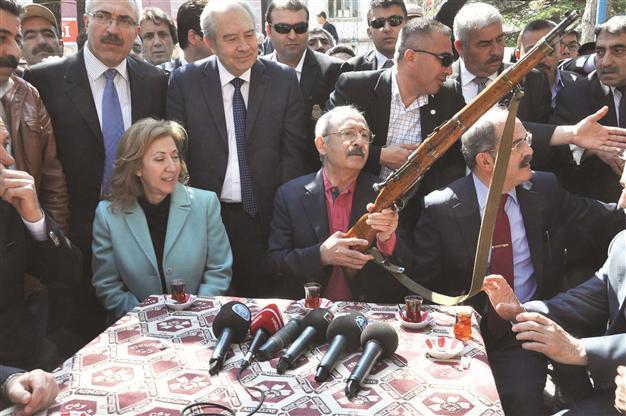Turkish opposition urges Gül to veto education bill
ANKARA-Hürriyet Daily News

Main opposition Republican People’s Party (CHP) leader Kemal Kılıçdaroğlu examines a rifle he got from a war veteran during his visit to the central Anatolian province of Eskişehir yesterday. Kılıçdaroğlu urged President Gül to veto the education bill. DHA Photo.
Main opposition Republican People’s Party (CHP) leader Kemal Kılıçdaroğlu has urged President Abdullah Gül to veto the controversial educational bill that was passed by Parliament late March 30, adding that his party will ask the Constitutional Court to scrap the bill if Gül approves it.“The president represents the whole country and its future. He should not act in line with the expectations of the ruling party. I hope the President will act responsibly. Our [lawmakers] are examining the bill. If we find any unconstitutional amendments, of course we will apply to the Constitutional Court [if Gül approves it],” Kılıçdaroğlu told reporters yesterday.
CHP deputy group chair Muharrem İnce, meanwhile, voiced skepticism on Gül’s stance on the bill, indicating that the CHP does not expect a veto from Gül. “President Gül has never misled us. But maybe he will remember that he is the president of the secular Republic of Turkey. Today is [April Fools’ Day], so maybe he will surprise us, but I’m not hopeful [that he will veto the bill],” İnce said.
Ball in Gül’s court
All eyes are on Gül, who will make the final decision on the long-debated education bill. The Parliament speaker’s office submitted the bill to the president late Saturday. Gül has 15 days to examine the bill.
If it stands, the education bill will increase mandatory education to 12 years divided into three four-year tiers, profoundly overhaul Turkey’s education system, and introduce the Quran as an elective course for middle and high schools.
Prime Minister Recep Tayyip Erdoğan hailed the bill, saying that one of the most important remaining traces of the “Feb. 28 process” had been removed. He also said that the bill secured the freedom of religious learning. “Our nation has obtained complete freedom to learn its religion through the efforts of our government, just as it obtained the Azan [in Arabic] through the efforts of Adnan Menderes in 1950,” Erdoğan said March 31.
In a related development, ruling Justice and Development Party (AKP) deputy and co-chair of the Turkey-EU Joint Parliamentary Committee Afif Demirkıran sent a letter to the European Parliament’s (EP) Turkey Rapporteur Ria Oomen-Ruijten responding to criticisms included in a recent EP report on Turkey.
“This reform will be an indication of Turkey’s democratization and modernization. With an education system that is more flexible, more effective, and more easily accessible to a wider range of people, Turkey will move a step forward towards EU membership,” Demirkıran said in his letter.
















